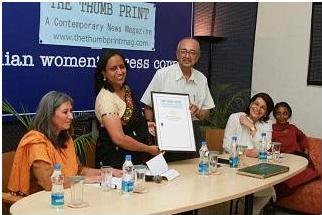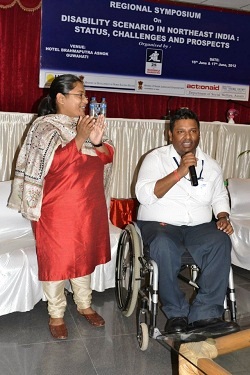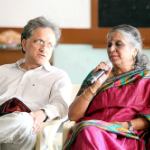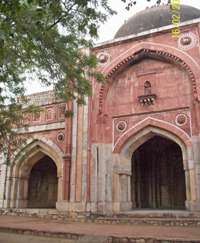The saga of Ashis Nandy, one of India’s foremost intellectuals who dared speak his mind at the Jaipur Literature Festival last week, is symptomatic of today’s national affliction : Our problem, to iterate another noted writer Harsh Sethi, is that we don’t read and we don’t listen enough anymore.
I suppose the argumentative Indian, a label that we so affectionately ascribe to ourselves, had to meet his/her comeuppance someday. Amartya Sen and Arnab Goswami notwithstanding, Indians seem to have fallen in love with their voice, the shriller the better. And if a score of people are arguing in favour of the most populist code, how could anyone dare to differ?
But first the so-called crime : Speaking at a session called the ‘Republic of Ideas’ in Jaipur, Nandy pointed out that the universe of corruption in India has been made much more egalitarian by the entry of Scheduled Castes, Backward Castes and tribals, and that much of the noise around today’s scams and scandals is largely because these latter groups are much more inept at hiding it. That the upper castes, having had so much more practise simply because they’ve been at it for so long, are much more efficient and sophisticated at covering up their own illegal practices.
The statement brought the political heavens down. From Brinda Karat of the CPI(M) to P L Punia of the Congress to Ram Vilas Paswan of the Lok Janshakti Party, senior politicians rounded up on Mr Nandy, accusing him of vilifying the lower castes. Punia, in fact, has even asked the Rajasthan governor Margaret Alva, who incidentally belongs to his own party, why Prof Nandy has not been arrested so far.
Does India have a particularly thin skin? In the late 80s, we had the honour of banning Salman Rushdie’s ‘Satanic Verses’ even before the Iranian theocracy of Ayatollah Khomeini did so. Within a year, around 1990, the movie, ‘The Last Temptation of Christ,’ was banned because it showed Jesus making love to Mary Magdalene and this offended some Christian groups. The demolition of the Babri Masjid at the hands of rabid Hindu groups because “they” believed that Ram was born at the exact same spot later led to the slaughter of hundreds of Indians in its wake.
The problem with freedom of speech is that it is imbued with the right to challenge the other. It comes built in with the right to concede space to the opposition’s argument, with the acceptance that ours is not a god-given word. India’s founding fathers understood that the parliamentary form of government was most right for a republic as fractious and varied as ours where we, the people, would elect – not nominate – our representatives and that all were equal in the eyes of the Hon’ble Speaker in the House.
So how did the political class become such authoritarian arbiters? As politics became much more federal in character, seeping into the tehsil and the municipality and the state, and as regional parties began to wield much more power, the over-arching grand vision of men and women wearing pan-Indian lenses has taken a knocking. Today’s India, with Mayawati, Mamata Banerjee and Jayalalithaa at the helm of their own fiefs is much more pluralistic than Jawaharlal Nehru’s India, but it is also much more susceptible to the limitations of majoritarianism.
Nehru was a man of such incredible vision and integrity that he was able to subsume the anti-Muslim poison that spread in the aftermath of Partition in 1947, thereby beating back the charge of the Hindu majority which wanted the new state to be a likeness of the Islamic republic of Pakistan. Nehru went against the majoritarian grain because he understood that in a true republic the rights of the minorities must be sustained at the cost of everything else.
The best thing about the Ashis Nandy fiasco is that Dalit empowerment may have finally come of age. It is fascinating the way Dalit and other political leaders, cutting across political lines, have sought to shut up such a well-known intellectual as Prof Nandy – and doubtless, they have used several of his arguments to empower themselves along the way – and insist that only they can be the arbiters of their community.
In a certain way, this is an achievement too (even if its a dubious one)! At least Dalit leaders and others are making sure that there are no holy cows in India, even if this particular challenge of theirs is a totally spurious one.
Which brings us back to the thin-skin argument, which seems to me is directly proportional to ideological insecurity. Rabid Hindu groups like the Vishwa Hindu Parishad and the Bajrang Dal were insecure about their belief that Ram was born at the exact same spot where the Babri masjid stood, unlike other Hindu sects who seemed content that the avatar of Vishnu were part of their entire being, within and without. The Catholic groups who protested the film on Jesus Christ and the Muslim groups who issued a fatwa against Salman Rushdie were similarly incapable of expanding their mindspace, unlike other Muslims and Christians, to accommodate a different point of view.
It is this brittle majoritarianism that is the greatest threat to India’s fabled tolerance. Gandhi foresaw the wars, which is why the instrument of non-violence or ‘ahimsa’ is such an incredible weapon. Arresting Ashis Nandy or blacklisting him because he dares to think differently would diminish the republic as well as our own idea of a unique civilisation.
Find us on facebook: facebook.com/TheThumbPrintMag







































